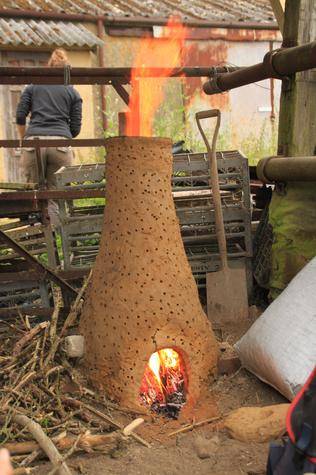2016 IAMS Summer School programme
13 April 2016
Running for over a decade, the IAMS Summer School typically offers classes to those interested in the archaeology of metallurgy.

The Summer School will take place at the Institute of Archaeology during the last two weeks of June (23/06-01/07) and the programme will be devided in two formats. The first week will include a lecture on iron smelting at UCL, followed by a three day experimental iron smelting workshop in Monkton Up Wimborne, Dorset. The workshop will focus primarily on the practical aspects of bloomery iron smelting, including ore preparation and roasting, furnace construction, smelting in two types of furnaces (induced and natural draft), slag formation and smithing. Students will be expected to get actively involved in these activities.
The second week will follow the traditional format and will be focussed on the archaeometallurgy of gold and silver. Lectures will be given by a series of academic experts in their respective fields.
Week 1: Bloomery iron smelting: theory, archaeology and experiment
- Monday: Foundations of bloomery iron smelting. Archaeological and ethnographic examples. Slag analysis and technological reconstructions (Jane Humphris).
- Tuesday-Thursday: Experimental iron smelting workshop. Monkton Up Wimborne, Dorset, UK.
A three-day workshop led by experienced iron smelter Jake Keen, together with archaeometallurgist Jane Humphris. The workshop will focus primarily on the practical aspects of bloomery iron smelting, including ore preparation and roasting, furnace construction, smelting in two types of furnaces (induced and natural draft), slag formation and smithing. Students will be expected to get actively involved in these activities.
[Logistics: Departure from London on Tuesday morning, and return on Thursday evening. Students will spend two nights at the nearby Church Farm camping site, which has showers, electricity and all necessary facilities, but students will be expected to bring their camping gear (tent and sleeping bag). Most of the day activities will take place outdoors, so waterproof clothing and strong boots will be necessary too. Let us know if you have trouble getting camping gear, though we would appreciate it if students could sort out these issues among themselves]
Week 2: Archaeometallurgy of gold and silver
- Monday: Foundations. Gold and silver in nature. Smelting, cupellation, parting (Marcos Martinón-Torres).
- Tuesday: Archaeometallurgy of gold and silver in the field: mining technology and smelting sites. Historical sources, field surveys and excavation (Brigitte Cech).
- Wednesday: Gold and silver in prehistoric Iberia: chemical analyses, isotopes and provenance (Mercedes Murillo-Barroso).
- Thursday: Gold and silver in the Staffordshire Hoard: technology, microanalysis and XRF (Eleanor Blakelock)
- Friday: Gold and silver in the Americas, before and after Columbus (Marcos Martinón-Torres).
Registration fees:
Week 1 (20-23 June): £300 (includes travel, accommodation, and meals during the experimental workshop)
Week 2 (27 June - 1 July): £200
Two weeks: £450
Contact: Umberto Veronesi (umberto.veronesi.13@ucl.ac.uk)
Some additional subsidy may be available for students in financial hardship - please contact Marcos Martinón-Torres if you would like to discuss this (m.martinon-torres@ucl.ac.uk).
 Close
Close

